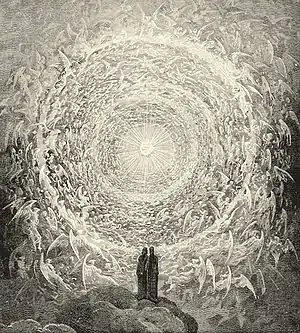List of Christian universalists
This is a list of writers who advocated Christian Universalism—specifically, Trinitarian Universalism prior to the 1961 creation of the Unitarian Universalist Association. Early Christians—from the second through fourth centuries—have been catalogued by scholars Hosea Ballou (Ancient History of Universalism, 1828), John Wesley Hanson (Universalism: The Prevailing Doctrine of the Christian Church During Its First Five Hundred Years, 1899), George T. Knight (The New Schaff-Herzog Encyclopedia of Religious Knowledge, 1911), and Pierre Batiffol (Catholic Encyclopedia, 1914), but modern scholarship questions the claim that all of these individuals were believers in universal reconciliation.[a] Some of those listed here may have simply believed in apokatastasis in the Jewish or early Christian sense, without any intention that all who had ever lived would be saved.
| Part of a series on |
| Universalism |
|---|
 |
| Category |
Several modern Christian theologians have been deemed "hopeful Universalists" for a belief in the possibility of universal reconciliation, but who did not claim it was a dogmatic fact—e.g. Karl Barth and Cormac Murphy-O'Connor.
Table
| Name | Lived | Nationality | Denomination | Notes |
|---|---|---|---|---|
| Richard Coppin | 1500s or 1600s–1660s | English | Anglican, later Presbyterian Ranter | Anglican clergyman |
| William Law | 1686–April 9, 1761 | English | Anglican | Cleric |
| Jane Leade | 1624–1704 | English | Behemenist, later Philadelphian | Mystic, founder of the Philadelphians |
| Alexander Mack | July 27, 1679–January 18, 1735 | German | Reformed, later Brethren/German Baptist | Founder and first minister of the Brethren/German Baptists |
| Giovanni Pico della Mirandola | February 24, 1463–November 17, 1494 | Italian | Roman Catholic | Kabbalist and philosopher |
| John Pordage | 1607–1681 | English | Anglican, later Philadelphian | Priest and mystic |
| Andrew Michael Ramsay | January 9, 1686–May 6, 1743 | Scottish | Roman Catholic | |
| Thomas Potter | 1689–1777 | American | Baptist, later Universalist Church of America | Universalist minister |
| Gerrard Winstanley | 1609–September 10, 1676 | English | Digger and Quaker | |
| George Macdonald | December 10, 1824 - September 19, 1905 | Scottish | Congregational | Clergyman and writer of novels |
| Maria Cook | 1779 - December 21, 1835 | American | Universalist | First woman to be recognized as a Universalist preacher. |
Notes
- ^ For example, Frederick W. Norris in the article on apocatastasis in 2004's The Westminster Handbook to Origen writes that "As far as we can tell, therefore, Origen never decided to stress exclusive salvation or universal salvation, to the strict exclusion of either case."
Works cited
- Ballou, Hosea (1885), The Ancient History of Universalism: From the Time of the Apostles to the Fifth General Council (4th ed.), Chicago, Illinois and Boston, Massachusetts, United States: Universalist Publishing House
- Battifol, Pierre (1907), "Apocatastasis", in Herberman, Charles G.; Pace, Edward A.; Allen, Condé; Shahan, Thomas J.; Wynne, John J. (eds.), The Catholic Encyclopedia: An International Work of Reference on the Constitution, Doctrine, Discipline, and History of the Catholic Church, vol. 1, United States: The Encyclopedia Press
- Hanson, John Wesley (1899), Universalism: The Prevailing Doctrine of the Christian Church During Its First Five Hundred Years (1st ed.), Chicago, Illinois and Boston, Massachusetts, United States: Universalist Publishing House
- MacDonald, Gregory, ed. (2011), "All Shall Be Well": Explorations in Universal Salvation and Christian Theology from Origen to Moltmann (1st ed.), Eugene, Oregon, United States: Cascade Books, ISBN 978-1-60608-685-8
- Parry, Robin; Partridge, Christopher H., eds. (March 2004), Universal Salvation? The Current Debate (1st ed.), Grand Rapids, Michigan, United States and Cambridge, England, United Kingdom: Wm. B. Eerdmans Publishing Company, ISBN 0-8028-2764-0